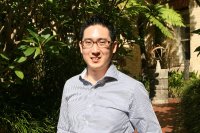In my column last month, I spoke about vital skin disease research being undertaken by scientists in the Centenary Institute’s Immune Imaging program.
Whilst it is our business as scientists to seek answers to complex medical health issues - it’s the passion and dedication which drives scientists that also tells an interesting story.
I’d therefore like to introduce one of Centenary’s young scientists, Dr Philip Tong.
Dr Tong is a PhD scholar in Professor Wolfgang Weninger’s Immune Imaging lab and a Dermatology Registrar at Royal Prince Alfred (RPA) Hospital in Sydney. He is also one of the first three ‘Dean’s Fellow’ candidates at the Sydney Medical School. In an extract from a recent interview, Philip talks about what drew him to the study of dermatology and what it is that inspires him to continue his research pursuits.
Dr Philip Tong

“I was drawn to dermatology by chance. My father had an itchy skin condition on his neck that was related to stress and I remember him telling me how much it affected him. It was after he’d been to see a dermatologist that I could see him starting to get better - and it was this that compelled me to study skin diseases.
"The thing about skin disease is it is very apparent – you can see it – and when it gets better you see that too.
"Skin disease runs in my family and I personally experience itchy and scaly skin. My cousin has severe atopic eczema and I can tell it’s a burden for him in terms of how he feels about himself.
"It’s easy to tell people to stop scratching but despite understanding what itch is, and what drives that itch, I still scratch anyway, which makes my skin worse. And the medicated creams and moisturisers you need to apply as treatment make your skin feel greasy all the time.
"So you can see how I really empathise with my family and my patients and this is what also helps me see the value of my research.
"People need to appreciate their skin - it’s our largest organ - and it’s important that people don’t underestimate the enormous burden of skin disease.
"I study the immune system in the skin. Not only does the skin contain a vast number of immune cells, there are so many different types. My aim is to understand if variations among different areas of skin exist and what role they play in the risk of skin cancer, skin infections, and the different appearance of skin diseases.
"I believe if more money is invested in skin research we’ll be able to pursue discoveries and improved treatments.”
Impact of eczema and psoriasis
Like Dr Tong and his family, eczema and other common inflammatory skin conditions, such as psoriasis, can remain with sufferers for their entire life. And it is for these reasons that Philip is so passionately driven to further study the immune system in the skin, to reduce the burden of these diseases, and to find better treatments and cures.
Eczema is an allergic disease which usually appears early in life. Its incidence is on the rise such that it now affects up to 30% of children in the Western world. Although most children grow out of the condition, a small percentage experience severe eczema into adulthood.
Psoriasis affects 1 in 40 Australians, mainly young adults, and once a person develops psoriasis, it usually continues throughout their life.
For eczema and psoriasis, there is no known cure and they can bring substantial stress and anxiety, not only to patients but also to their loved ones.
Professor Weninger and his team at Centenary are attempting to unravel the mysteries of these debilitating inflammatory skin conditions using state-of-the-art microscopy technology.
Over the last two decades, it has become increasingly apparent that neither eczema nor psoriasis develops from a single cause. Rather, they result from the interplay of a wide range of genetically and environmentally determined factors. Although this variation has been well documented for these inflammatory skin conditions, our understanding of the factors that are responsible for this heterogeneity remains in its infancy.
One of the major obstacles blocking such investigation is our limited capacity to sub-classify these inflammatory diseases according to their underlying cause. Skin samples taken from affected regions can look very similar when examined using traditional tools (usually examination under a microscope) despite having, potentially, very different causative mechanisms. Thus, one of the ‘Holy Grails’ of modern medicine is the ability to identify the genetic, molecular and cellular processes that are driving a particular disease within a given patient, as this would pave the way for more effective therapies that could be specifically tailored for each individual.
Currently, scientists at the Centenary have initiated a broad-scope study to examine skin samples from patients with inflammatory skin conditions, including eczema and psoriasis, using sophisticated technology. Professor Weninger and his team hope to gain new insight into the cellular and molecular composition of psoriatic skin lesions, which could pave the way for better therapy.
Nevertheless, there is a lot that is still not understood about how the immune system works, how it is controlled and how it can be effectively targeted for therapy.
* * *
For further information, or to make a donation to support Centenary's skin disease research, please visit the Centenary Foundation.



















__small.png)










